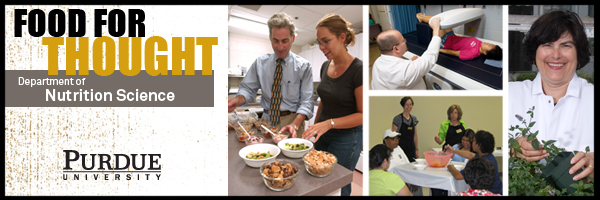| Upcoming Department Events
Kirksey Lecture: Nancy Krebs, MD, Professor of Pediatrics at Colorado State University will be the speaker on Friday, April 5. She will present Complementary Feeding Strategies for Breastfed Infants: What's the evidence that it matters? of Pediatrics at Colorado State University will be the speaker on Friday, April 5. She will present Complementary Feeding Strategies for Breastfed Infants: What's the evidence that it matters?
May Conference: The department's annual conference will be held on May 9. The theme will be Feeding the Future. More details to follow in an upcoming issue.
Weaver Receives Spirit of the Land-Grant Mission Award
Nutrition scientist and distinguished professor Connie Weaver was awarded Purdue University's 2012 Spirit of the Land-Grant Mission Award for improving nutrition recommendations for children, adolescents and adults nationwide through her research in calcium absorption and bone health.
The award is presented yearly to a Purdue faculty member in the Colleges of Agriculture, Health and Human Sciences or Veterinary Medicine whose work exemplifies the university's land-grant mission of discovery, engagement and learning.
Much of Weaver's work with children and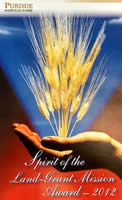 adolescents takes place at Camp Calcium, a six-week camp designed to measure calcium absorption and use in children and younger teenagers. The camp, held annually for the last 22 years, gives adolescents a chance to explore careers and take science and math classes in a college environment while researchers control their diets and measure the amount of calcium their bodies absorb. adolescents takes place at Camp Calcium, a six-week camp designed to measure calcium absorption and use in children and younger teenagers. The camp, held annually for the last 22 years, gives adolescents a chance to explore careers and take science and math classes in a college environment while researchers control their diets and measure the amount of calcium their bodies absorb.
"The award reflects excellence in research, teaching and engagement, and Connie demonstrates this excellence in a way that very few have," said Karen Plaut, director of agricultural research and associate dean of Purdue Agriculture. "Connie embodies the spirit of the whole award, particularly in the area of engagement. She truly has an attitude of 'let's take that research out and get it to the public.' She has greatly impacted the lives of children - and adults, too - through her work with Camp Calcium."
Weaver has brought her knowledge to a variety of national boards and organizations, including the National Academy of Sciences Food and Nutrition  Board Panel, where she helped develop government standards for the amount of calcium that adolescents should consume to optimize bone strength and prevent osteoporosis. Her recommendations were used to develop the U.S. Department of Agriculture's MyPlate dietary guidelines. Board Panel, where she helped develop government standards for the amount of calcium that adolescents should consume to optimize bone strength and prevent osteoporosis. Her recommendations were used to develop the U.S. Department of Agriculture's MyPlate dietary guidelines.
Conducting research with the purpose of informing the public of the results is a hallmark of Weaver's research and Extension program, said Jim Mintert, interim director of Purdue Extension." Dr. Weaver provides a great example of how a land-grant university faculty member can truly help improve the lives of people, not only in Indiana but throughout the world," he said. "The impact of her work will be felt for very many years to come as it's reflected in improved bone health and reductions in osteoporotic fractures as our population ages."
Weaver received a commemorative plaque, $10,000 to support her research and a $1,500 honorarium.
Adapted from article written by Jessica Merzdorf, Purdue News Service
Effects of Whey Protein Supplementation on Body Composition in Overweight and Obese Adults with Metabolic Syndrome
Metabolic syndrome is a combination of medical conditions that increase the risk of developing heart disease and diabetes. Limited research suggests that eating a higher protein diet may enhance e xercise-induced improvements in body composition and components of metabolic syndrome, including blood pressure, cholesterol, and glucose. Dr. Wayne Campbell in the Department of Nutrition Science led a study to examine the effectiveness of increased total dietary protein intake, through whey protein supplementation, to enhance changes in body composition and positively change indeces of metabolic syndrome with resistance (strength exercises) and aerobic exercise training in overweight and obese middle-aged adults. xercise-induced improvements in body composition and components of metabolic syndrome, including blood pressure, cholesterol, and glucose. Dr. Wayne Campbell in the Department of Nutrition Science led a study to examine the effectiveness of increased total dietary protein intake, through whey protein supplementation, to enhance changes in body composition and positively change indeces of metabolic syndrome with resistance (strength exercises) and aerobic exercise training in overweight and obese middle-aged adults.
A total of 327 overweight and obese men and women (aged 35-65 years) participated in a 9-month study in which they were randomly assigned to 1 of 4 groups to consume 0, 20, 40, or 60 grams of a whey protein supplement daily. All participants performed resistance (2 days/week) and aerobic (1 day/week) exercise for the duration of the study. Various body composition and blood measurements were taken, and food records were completed pre-, mid-, and post study.
Results in dicate that whey protein supplementation didn’t affect exercise training-induced responses in body composition and indices of metabolic syndrome in middle-aged overweight and obese adults who maintained body weight. However, this study supports the success of a community-based exercise training intervention to positively influence fitness and body composition and promote metabolic health. dicate that whey protein supplementation didn’t affect exercise training-induced responses in body composition and indices of metabolic syndrome in middle-aged overweight and obese adults who maintained body weight. However, this study supports the success of a community-based exercise training intervention to positively influence fitness and body composition and promote metabolic health.
The research was supported by the U.S. Whey Protein Research Consortium and the National Institutes of Health. For more information on the study, contact Dr. Wayne Campbell.
Spring Corporate Affiliates Features Dual Focus: Sources of Key Nutrients and Food Insecurity
Corporate Affiliates representatives and guests visited Purdue in February to hear about current research comparing sources of key nutrients for synthetic vs. natural/forms/metabolites for bioavailability and health outcomes from department faculty and other experts. Topics included: vitamin E (Dr. Qing Jiang), folic acid (Dr. Patrick Stover, Cornell University), vitamin D (Dr. James Fleet), and calcium (Dr. Connie Weaver).
The second symposia featured ongoing work at Purdue and elsewhere on food insecurity. Purdue researchers have received the World Food Prize twice in the last decade. The most recent recipient, Dr.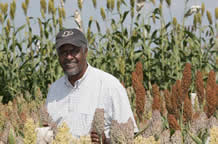 Gebisa Ejeta, is helping to feed Africa with his disease resistant sorghum. He serves as the director of Purdue’s Center for Global Food Insecurity. Dr. Heather Eicher-Miller shared an overview of the current U.S. situation. Clara Park, postdoctoral fellow, described an investigation of dietary and nutritional associations in pregnant women. Dr. Craig Hadley, Emory University, spoke about the social and mental health consequences of food insecurity. Other highlights of the meeting included tours of the department laboratories and new research capabilities and a tasting event at Main Street Cheese and Wine Cellar in Lafayette. Gebisa Ejeta, is helping to feed Africa with his disease resistant sorghum. He serves as the director of Purdue’s Center for Global Food Insecurity. Dr. Heather Eicher-Miller shared an overview of the current U.S. situation. Clara Park, postdoctoral fellow, described an investigation of dietary and nutritional associations in pregnant women. Dr. Craig Hadley, Emory University, spoke about the social and mental health consequences of food insecurity. Other highlights of the meeting included tours of the department laboratories and new research capabilities and a tasting event at Main Street Cheese and Wine Cellar in Lafayette.
| |
 |
|
Graduate Students Recognized
The Interdepartmental Nutrition Program poster session was held on February 22, 2013. The poster session was part of the larger event for prospective graduate students. Fifteen prospective  graduate students met with professors in the department and were able to participate in the Corporate Affiliates presentations. These prospective students shared lunch with faculty, staff, Corporate Affiliates, current graduate students and postdoctoral research associates. There were twenty-eight posters about research findings presented by graduate students, postdoctoral research associates and others. The graduate student posters were judged, and the winners $500 to travel to a professional conference. Students and their poster session topic were: graduate students met with professors in the department and were able to participate in the Corporate Affiliates presentations. These prospective students shared lunch with faculty, staff, Corporate Affiliates, current graduate students and postdoctoral research associates. There were twenty-eight posters about research findings presented by graduate students, postdoctoral research associates and others. The graduate student posters were judged, and the winners $500 to travel to a professional conference. Students and their poster session topic were:
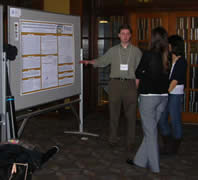 Joshua B. Jones: Effect of variety on peanut acceptability, study compliance, and health outcomes over a 12-week peanut consumption study. Joshua B. Jones: Effect of variety on peanut acceptability, study compliance, and health outcomes over a 12-week peanut consumption study.
Katherine Osei-Boadi: Effects of pulse physical form and digestive enzyme availability on postprandial glucose and appetite responses.
Honorable Mention: Wei Zheng: 1,25 dihydroxyvitamin D regulation of energy metabolism in MCF10 human breast epithelial cells.
| |
 |
|
New Pathways to Obtaining RD
The Didactic Program in Dietetics (DPD) recently received approval to host an Individualized Supervised Practice Pathway (ISPP) as an alternative way to be eligible to take the RD exam. Graduates from the Purdue University DPD who were not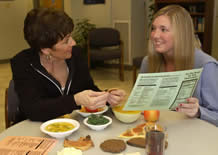 matched for a dietetic internship are eligible to apply for the ISPP. Interns in an ISPP locate their own supervised practice sites. The ISPP is designed to be flexible so that interns may continue to be employed and complete supervised practice on a part time schedule. More information will be available on the department website. matched for a dietetic internship are eligible to apply for the ISPP. Interns in an ISPP locate their own supervised practice sites. The ISPP is designed to be flexible so that interns may continue to be employed and complete supervised practice on a part time schedule. More information will be available on the department website.
|
